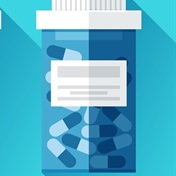Included in the report released Tuesday were the arthritis drugs Humira and Remicade, cancer drugs Rituxan and Erbitux, and the heart failure drug Natrecor. All wound up being flagged for safety.
That might surprise some doctors who may have thought that these new treatments might be safer than traditional chemical-based medicines.
Researchers found that most of the warnings came within five years after these biologicals won government approval in the United States and Europe between 1995 and 2007.
Many traditional medicines wind up with safety warnings too after they go on the market. But experts said there were no similar studies of older medicines that made it possible to compare safety issues between the two groups of drugs.
First comprehensive study
The new study, by Dutch researchers, is the first comprehensive examination of these newer medicines, a driving part of the biotech revolution.
The new drugs are known as biologicals because they're made from living material and often work by triggering the body's disease-fighting immune response.
It's that same mechanism that can result in side effects often not seen with traditional chemical-based medicines, including major infections and cancer, said Dr Charles Bennett, a Northwestern University drug safety expert. He was not involved in the research.
Many are genetically engineered and Bennett said that because they typically resemble naturally occurring proteins, many doctors have assumed they were safer than traditional chemical-based medicines. But he said the study shows that's not necessarily true.
"They have an important role," Bennett said. "They're really the next generation of pharmaceuticals."
He said the results simply show that doctors and patients should be aware that the drugs have many potential side effects that may not be listed on the label.
Among the drugs under examination are Genentech Inc.'s psoriasis drug Raptiva, which just last week the Food and Drug Administration warned may contribute to a life-threatening brain illness and infections; and Exubera, an inhaled insulin product, linked with lung cancer risks. Exubera was approved in the US in 2006 but Pfizer Inc. stopped selling it last year.
The study appears in the Journal of the American Medical Association.
Need to screen drug after approval
It involved 136 biologics approved in the United States and 105 in the European Union between January 1995 and June 2007. A total of 41, or nearly 24%, got safety warnings issued through June 2008.
The results are a concern, and they underscore the need for closer scrutiny of drugs after their approval, said lead author Thijs Giezen of the University of Utrecht.
But he said the study also is reassuring because most problems showed up relatively soon after the drugs became available, which minimized the potential for widespread harm.
"If most issues are discovered within the first few years, then the system is working," Giezen said.
Bennett says it's unreasonable to think that the studied drugs' safety issues should have been discovered before they were marketed. That's because drug approval is based on relatively small studies with patients who generally are healthier than those in the general population. It often takes real-world experience for side effects to appear, he said.
Many biological drugs have advantages over conventional medicine, but the study shows their risks need to also be considered, said Thomas Moore of the Institute for Safe Medication Practices. For example, non-steroid arthritis medicines including ibuprofen can reduce pain by decreasing inflammation, but they can cause stomach bleeding.
Biologic rheumatoid arthritis medicines Remicade, Enbrel and Humira are designed to ease painful joints by keeping the body's immune system from attacking itself, the underlying problem in the disease. But they are much more expensive and have been linked with higher risks for potentially fatal infections. Also, the FDA is investigating possible cancer risks.
"My message to patients is that these biological products often can treat very difficult to treat diseases but may have very substantial risks and that you need to take extra care to educate yourself as to what those risks might be," Moore said. – (Sapa)
Read more:
Vioxx's heart risk lingers
Cholesterol, heart drug warning
October 2008




 Publications
Publications
 Partners
Partners














